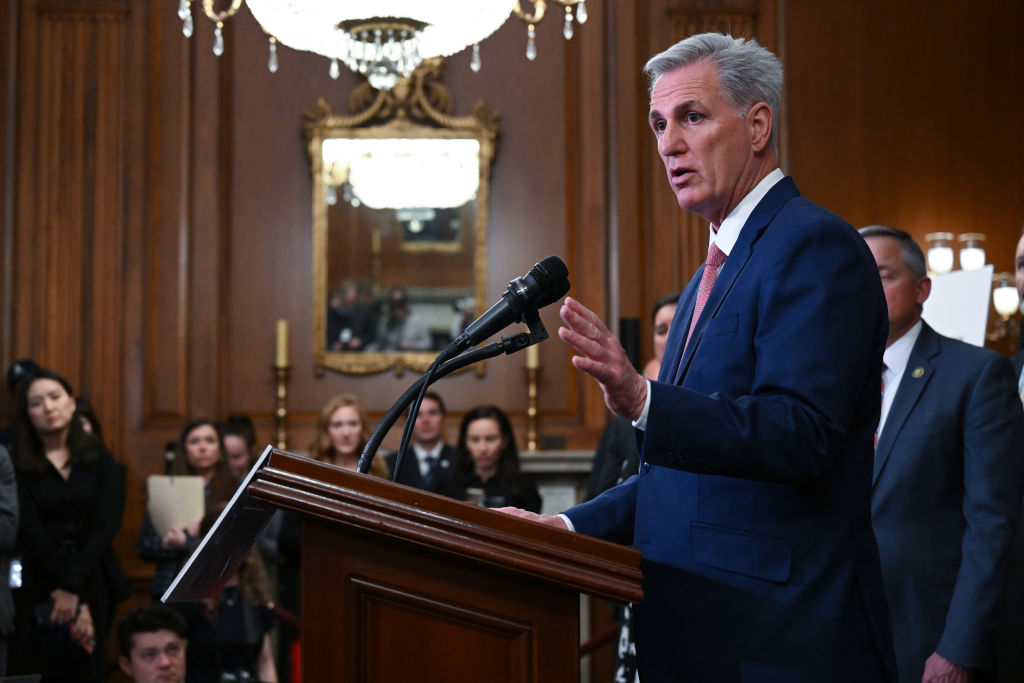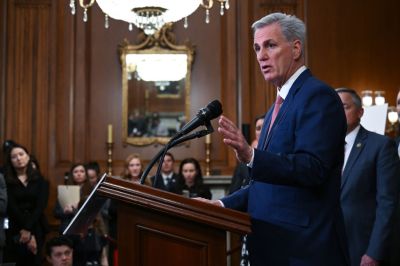Just before noon on March 30, the GOP-led House passed H.R. 1, the Lower Energy Costs Act. The bill would end some restrictions on the import and export of oil and natural gas, prevent the president from banning fracking, streamline permitting processes, and implement other measures to lower energy costs while improving transparency and accountability from the federal government. It’s smart policy and politics, and polling suggests it’s a good decision. While “climate change” doesn’t rank high on voters’ lists of concerns, inflation does. The bill addresses inflation and pocketbook issues in tangible ways by reducing the cost of energy, which affects the costs of everything.
For about seven hours, the GOP was in a great place.
Then, at 7:15 p.m., Manhattan District Attorney Alvin Braggs’ office tweeted a statement announcing his indictment of former President Donald Trump. While a majority of Republican members would have preferred to keep talking about H.R. 1, too many regressed into reflexively defending Trump.
In economics, this tension is called “opportunity cost” or, more precisely, “the loss of potential gain from other alternatives when one alternative is chosen.” If you spend too much on a car you might not have enough savings for college, and so on. This principle applies not just to money but to time and attention too. When political communicators use terms like “bandwidth” or something “sucking the oxygen out of the room” they’re really talking about opportunity cost. Anyone who has worked in politics knows that when the media is obsessed with X, you have to work harder to get people to focus on Y. And among GOP leaders, not just the Republican base, there is a widespread and willful blindness to the costs and tradeoffs of defending Trump.
The Lower Energy Costs Act is the perfect example of this. Its designation as “H.R. 1” means that it was the GOP’s signature agenda item. Republicans wisely concluded that an issue the left believes it “owns” gives them a major comparative advantage. Democrats have allowed themselves to become the “Party of No” on climate and energy, preferring to appease their increasingly fanatical base than support no-brainer policy reforms around improving access to American sources of energy and critical minerals.
The foundational concepts of H.R. 1 are popular not just among Republican voters but Democrats as well. A poll from C3 action, which I run, found that 63 percent of Democrats support an “all of the above” strategy (which includes increasing domestic production of hydrocarbons); 68 percent of Democrats support nuclear energy; and 49 percent of Democrats support fracking while only 32 of Democrats oppose it.
Voters also support the GOP’s approach to financing energy development. Two-thirds of Republicans and Democrats support streamlining regulations to speed up the deployment of new clean energy technology while Republicans and Democrats prefer to finance clean energy research through spending offsets (49 percent) over borrowing (13 percent) or tax increases (9 percent).
House Republicans got not just the policy but also the process right. House Speaker Kevin McCarthy smartly sought the input of his caucus and recruited members who could explain that the bill not only reduces inflation but emissions. For a conference that is supposedly riven by dissent and discord, H.R. 1 passed without drama.
Then came the indictment. The attention of GOP lawmakers shifted from celebrating a legislative victory to mourning Trump’s legal setback. Sen. Ted Cruz’s Twitter feed is instructive. In the week after March 30, Cruz’s tweets defending Trump outnumbered his tweets defending Republican energy policy by 20 to 1. His lone tweet on energy didn’t mention H.R. 1 or Senate Majority Leader Chuck Schumer’s decision to obstruct the bill. No one forced Cruz to make an opportunity cost decision that is harmful to his constituents who are paying more than necessary for gas and groceries. He did that on his own.
Or consider Sen. Rand Paul, who made the very unlibertarian argument that, “A Trump indictment would be a disgusting abuse of power. The DA should be put in jail.” When a reporter asked him to cite what law Bragg violated that warranted jail time, Paul referred the reporter to his tweet.
No one is happier to hear these GOP senators undercut the serious work of House Republicans and shift the conversation back to Trump than Schumer.
As Schumer said on the Senate floor on March 30, “The House is expected today to vote on Republicans’ partisan, unserious, and so-called energy package that they call H.R. 1. … I want to make it clear, H.R. 1 is dead on arrival in the Senate. Not because of politics, but because it's so ridiculous. And it has been drawn up by a bunch of pro-oil senators with no regard for anything else. … Let's stop this political game playing. Let's stop this throwing bones to the MAGA hard right, which represents maybe 5 percent of America.”
Cruz, Paul, and others could have pulled out the heavy guns against Schumer’s flimsy arguments. Schumer knows his party is vulnerable because H.R. 1 is popular with his base, not just the “MAGA hard right” (whatever that is). Instead, too many in the GOP directed their fire at the Manhattan DA and elevated the narrative that the GOP cares more about defending Trump than advancing conservative policy.
The vast majority of Republican legislators would rather promote H.R. 1 than Trump. Yet, that isn’t going to happen until they drown out voices in their own conference who would rather defend Trump than sell a conservative agenda. House Republicans sent a promising signal this week when Speaker McCarthy’s office suggested his opening bid on a debt ceiling deal will include H.R. 1 as a whole or in part.
One of the great mysteries of Trump’s ongoing appeal is his losing streak. Part of the appeal is cultural—in our polarized times, tribal camaraderie can seem more satisfying than building coalitions that can win. Always Trumpers (and grifters who profit from division) believe it’s easier to sell what Sen. Tim Scott calls “the empty calories of anger” (i.e. political circus food like cotton candy and funnel cakes) than a more balanced diet of principles, clear thinking, and good policy. Yet, millions of Americans want to make choices that are healthier for themselves and the body politic. It’s time for the GOP to listen to them.





Please note that we at The Dispatch hold ourselves, our work, and our commenters to a higher standard than other places on the internet. We welcome comments that foster genuine debate or discussion—including comments critical of us or our work—but responses that include ad hominem attacks on fellow Dispatch members or are intended to stoke fear and anger may be moderated.
With your membership, you only have the ability to comment on The Morning Dispatch articles. Consider upgrading to join the conversation everywhere.